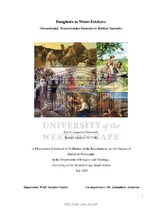Daughters as water-fetchers: ‘Streamlining’ water-gender dialectics in biblical narrative
Abstract
Biblical interpreters have often been unwittingly anthropocentric in their reading of
biblical narratives, ignoring the living and nonliving presence of physical world characteristics
that underpin the narrative’s overall framework. Moreover, with a focus on men, women’s role as
water fetchers has been overlooked, resulting in the text’s dual undermining of ecological and
gender issues. This thesis attempts to move away from such interpretations and reread selected
biblical texts about water and women using a dual-mode of inquiry, namely gender-ecocriticism.
A central question within ecocritical inquiry is—how is nature represented in the narrative?
Furthermore, on the subject of gender criticism— how are daughters narrativized in the text? These
are the two critical questions that this thesis intends to explore.
There are only five explicit narratives of ‘daughters fetching water at the well’ in the Bible.
Nevertheless, these scenic activities are significant because of their historical link to the waterfetching daughters in the contemporary world. This study draws attention to the gendering of the
water-fetching task by a gender analysis of the five texts. To understand why only daughters are
assigned the task of water-fetching, the study draws on theories of the sexual division of labour.
The first theme I discuss in this dissertation is water symbolism as found in Judeo-Christian and
contemporary stories of water and its interplay with current issues of water scarcity. The focus of
the second part is the water-gender intersections found in those five narratives. These themes are
explored in this thesis through an exegetical analysis of the five biblical water-drawing narratives.
The interpretation is based on socio-historical analysis as well as literary analysis employing
narratology and biblical hermeneutical methods.
This dissertation concludes that water stories demonstrate that water is more than a symbol.
The current water shortage crisis in some parts of the world directs our attention to the urgency of
reconfiguring water in our religious and theological imaginations. Water becomes an intrinsic
feature in the reader’s mind when read from a gender-ecocritical angle. Being appreciative of each
physical element in the vast expanse of the ecosystem, allows a reader’s imagination to reflect on
the global negative impact and the distortion of those valuable connections we as humans have
with the rest of the physical world.

